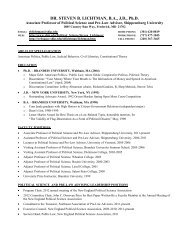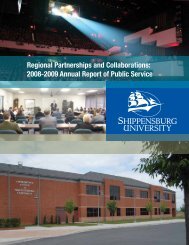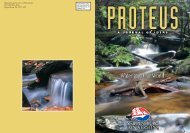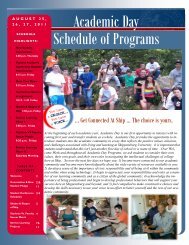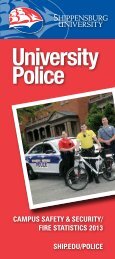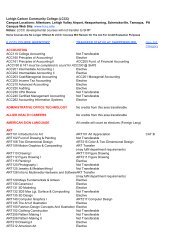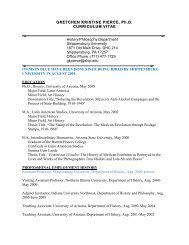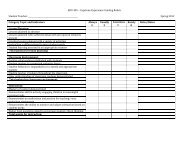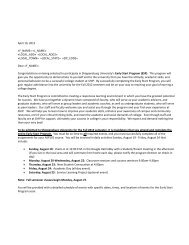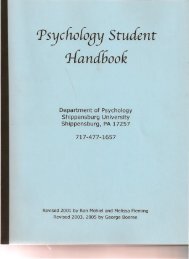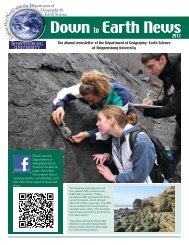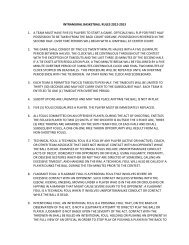Graduate Catalog - Shippensburg University
Graduate Catalog - Shippensburg University
Graduate Catalog - Shippensburg University
Create successful ePaper yourself
Turn your PDF publications into a flip-book with our unique Google optimized e-Paper software.
<strong>Shippensburg</strong> <strong>University</strong>College of Artsand SciencesJames H. Mike, Ph.D., Dean, College of Arts and Sciences (717-477-1151)Biology DepartmentTimothy J. Maret, Ph.D., Chair (477-1401)Marcie L. Baer-Lehman, Ph.D.Sherri E. Bergsten, Ph.D.Alyssa Bumbaugh, Ph.D.Pablo Delis, Ph.D.Lucinda H. Elliott, Ph.D.Todd M. Hurd, Ph.D.Marcie Lehman, Ph.D.Theo S. Light, Ph.D.David R. Long, Ph.D.Michael R. Marshall, Ph.D.Michael J. McNichols, Ph.D.Earl L. Nollenberger, Ed.D.William J. Patrie, Ph.D.Gregory S. Paulson, Ph.D.Heather F. Sahli, Ph.D.Richard L. Stewart, Ph.D.Nathan E. Thomas, Ph.D.Biology (M.S.)The Master of Science degree program in biology is designedto provide a strong foundation in the biological sciences within thediscipline.All applicants for admission must have completed at least 33semester hour credits of undergraduate biology or biology-relatedcourses (e.g. forestry, horticulture, environmental studies), and havetaken at least three chemistry courses with labs, including bothinorganic and organic chemistry or biochemistry. In addition, it isrecommended applicants have completed a course in evolution, mathematicsthrough calculus, and one year of physics.After admission to the graduate program in biology, the studentwill meet with his/her graduate advisor to complete a proposed courseof study form.Each candidate for a degree must complete a minimum of 31 semesterhour credits. All candidates must complete BIO593 Biometryand BIO515 How to Research, Write, and Publish a Scientific Paper.No more than 12 semester hours of 400-level courses may becounted toward the 31 semester hours of credit required for themaster’s degree.At least 21 credits must be earned in biology courses (includingcourses offered by the Marine Science Consortium at WallopsIsland). The remainder may be selected, with advisement, fromcourses such as chemistry, physics, mathematics, computer science, orgeography/earth science. Candidates simultaneously working towardssecondary certification may count EDU440 Teaching of Science inSecondary Schools and EDU441 Curriculum and Evaluation in theSecondary Science Classroom towards these remaining credits.Specific RequirementsMaster of Science in Biology (non-thesis)In addition to completing BIO593 and BIO515, candidates mustcomplete 27 semester hour credits. Candidates may elect up to six ofthese 27 semester hour credits as graduate research.Master of Science in Biology (thesis)In addition to completing BIO593 and BIO515, candidates mustcomplete 27 semester hour credits including six semester hour creditsof Thesis I and Thesis II (BIO612 and BIO613). Candidates mayalso elect up to three of these 27 semester hour credits as graduateresearch.Other Requirements1. All candidates must complete 31 semester hour credits with a 3.0QPA in a program of study and research approved by the student’sspecial committee.2. The thesis must be written in manuscript style format with anymaterial not appropriate for a scientific manuscript (i.e., voluminoustables) included as appendices. The specific style willdepend on the requirements of the individual journal to which themanuscript will be submitted.3. An oral thesis defense, advertised and open to the university community,is required.4. A formal seminar based on the thesis research must be presentedto the biology department by thesis candidates.5. One copy of the thesis will be housed in the biology departmentoffice.CoursesA plus sign (+) represents a required course in the appropriatetrack or degree.BIO408 Principles of VirologyBIO409 ImmunologyBIO417 HerpetologyBIO418 Molecular BiologyBIO423 Plant PathologyBIO430 Principles of EvolutionBIO442 Aquatic EcologyBIO444 Conservation BiologyBIO448 Field Botany and Plant TaxonomyBIO450 EndocrinologyBIO455 Algae and Aquatic PlantsBIO461 Techniques in BiotechnologyBIO462 Invertebrate ZoologyBIO463 Vertebrate ZoologyBIO478 MicrotechniquesBIO485 Biological Microscopy and ImagingBIO491 Selected TopicsBIO494 Field Research TechniquesBIO513 CytogeneticsBIO514 Aquatic Entomology+BIO515 How to Research, Write, and Publish aScientific Paper1 cr.BIO520 Plant EcologyBIO535 Problems in Plant PhysiologyBIO541 EcosystemsBIO547 Wetland EcologyBIO555 Comparative Environmental PhysiologyBIO558 Microbial EcologyBIO559 Evolutionary EcologyBIO577 EcomorphologyBIO581 Topics in Mammalian BiologyBIO583 Biological Techniques+ BIO593 BiometryBIO594 Selected Topics1-3 crs.BIO599 Independent StudyBIO600 Biological Research MethodsBIO605-608 <strong>Graduate</strong> Research3-12 crs.BIO609 Internship+ BIO612 Thesis I+ BIO613 Thesis II38



